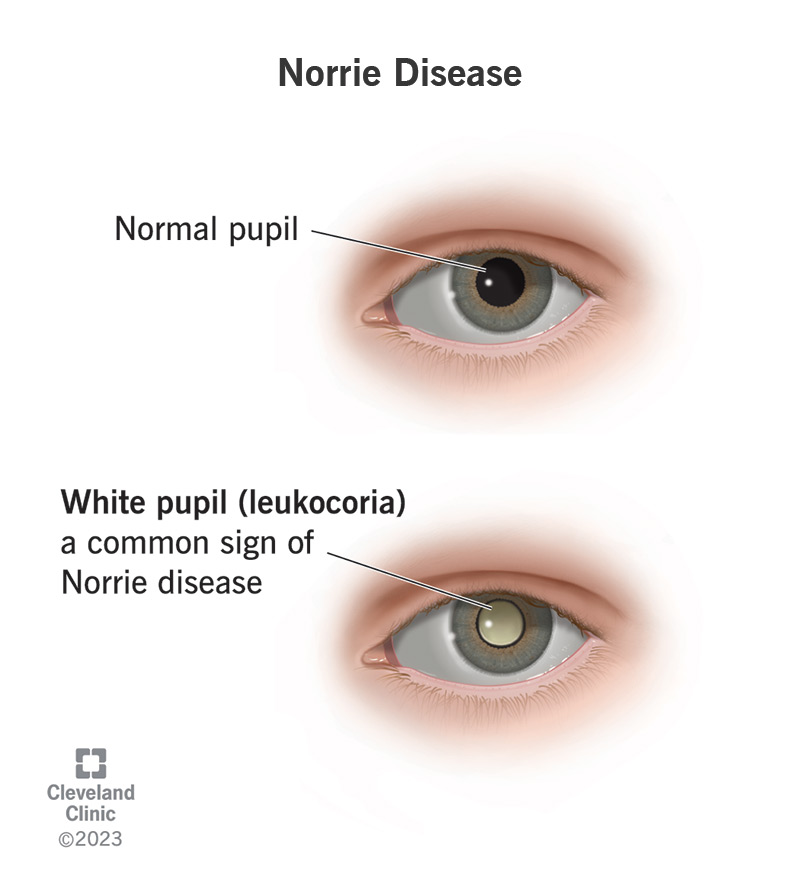Norrie disease is a rare inherited eye disease that affects your baby’s retina. The disease typically causes blindness at birth or within the first few months of your baby’s life. This condition mostly affects male babies. Babies with Norrie disease may also have hearing loss, behavioral changes and developmental delays.
Advertisement
Cleveland Clinic is a non-profit academic medical center. Advertising on our site helps support our mission. We do not endorse non-Cleveland Clinic products or services. Policy

Image content: This image is available to view online.
View image online (https://my.clevelandclinic.org/-/scassets/images/org/health/articles/25143-norrie-disease)
Norrie disease is a rare X-linked recessive genetic disease that causes congenital blindness and hearing loss. Babies who have it are born blind or lose their vision by the time they’re a few months old. Your baby may also develop hearing loss as they grow up. Males are more likely to have this disease, too.
Advertisement
Cleveland Clinic is a non-profit academic medical center. Advertising on our site helps support our mission. We do not endorse non-Cleveland Clinic products or services. Policy
The condition occurs when a genetic change happens during fetal development. The change affects how the fetus’s retina and inner ear develop. The combination of hearing and vision loss often leads to developmental delays, behavioral issues and intellectual disabilities.
Blindness at birth or soon after birth is the most common symptom of Norrie disease. Other symptoms include:
Norrie disease happens when the NDP gene changes. The change affects the norrin protein that helps retinas develop. The genetic change also affects the development of blood vessels that supply blood to your retina and inner ear. The change can lead to several eye disorders known as NDP-related retinopathies.
Advertisement
People inherit this Norrie disease through an X-linked recessive inheritance pattern. This genetic change means only one change on the X chromosome needs to pass from one biological parent to their male child for that child to inherit the change.
A family medical history of Norrie disease increases the risk that your child will inherit the genetic change that causes it. If someone in your family has this disorder, you may want to talk with a genetic counselor to learn more about your risk of having the disease or passing the genetic change on to a child.
People with Norrie disease may have certain conditions associated with the genetic change that leads to Norrie disease. Those conditions include:
An ophthalmologist will do an eye exam. They’ll look for signs of Norrie disease, like retinal detachment or if your child’s pupils look white. They’ll ask if any family member has Norrie disease. They may do genetic tests to look for the genetic change that causes the disease.
There isn’t a treatment to restore your child’s vision. Their ophthalmologist may recommend laser and/or specific surgeries to ease eye pain or manage conditions like retinal detachments and cataracts. If your child has hearing loss, they may benefit by:
Your child may also benefit from educational support services. It’s important to talk to administrators at your child’s school to learn what resources are available.
Some babies with Norrie disease have vision loss within the first few months of life. And they may develop hearing loss as they grow up. You should talk to your child’s pediatrician if you notice changes in your child, like:
Your child and you will face lifelong challenges. Those challenges will vary depending on how Norrie disease affects your child. Your child’s team of healthcare providers is your best resource of information about ways the condition may affect your child. But in general, they’ll have regular check-ups, including:
Advertisement
Your child may need help with managing daily life. Children with Norrie disease may have trouble going to sleep and staying asleep. Ask your child’s pediatrician for help if your child isn’t getting enough rest.
You need to take care of yourself so you can take care of your child. That may be easier said than done. You may feel like there aren’t enough hours in the day. Here are some suggestions that may help:
Advertisement
A Norrie disease diagnosis is a life-changing event. It means your child is blind or will become blind while they’re still very young. They may lose their hearing, too. They’ll need medical care and extra support as they grow up and for the rest of their life.
You may feel overwhelmed by all the ways that Norrie disease will affect your child. Their care team understands if you have lots of questions and concerns. They’ll be ready to answer questions. More than that, they’ll have suggestions for resources and programs that will help you and your child manage the challenges that Norrie disease may bring.
Advertisement

Sign up for our Health Essentials emails for expert guidance on nutrition, fitness, sleep, skin care and more.
Learn more about the Health Library and our editorial process.
Cleveland Clinic’s health articles are based on evidence-backed information and review by medical professionals to ensure accuracy, reliability and up-to-date clinical standards.
Cleveland Clinic’s health articles are based on evidence-backed information and review by medical professionals to ensure accuracy, reliability and up-to-date clinical standards.
When you need care for your child’s vision, it’s important to find someone you trust. Cleveland Clinic Children's experts focus on your child's needs.
